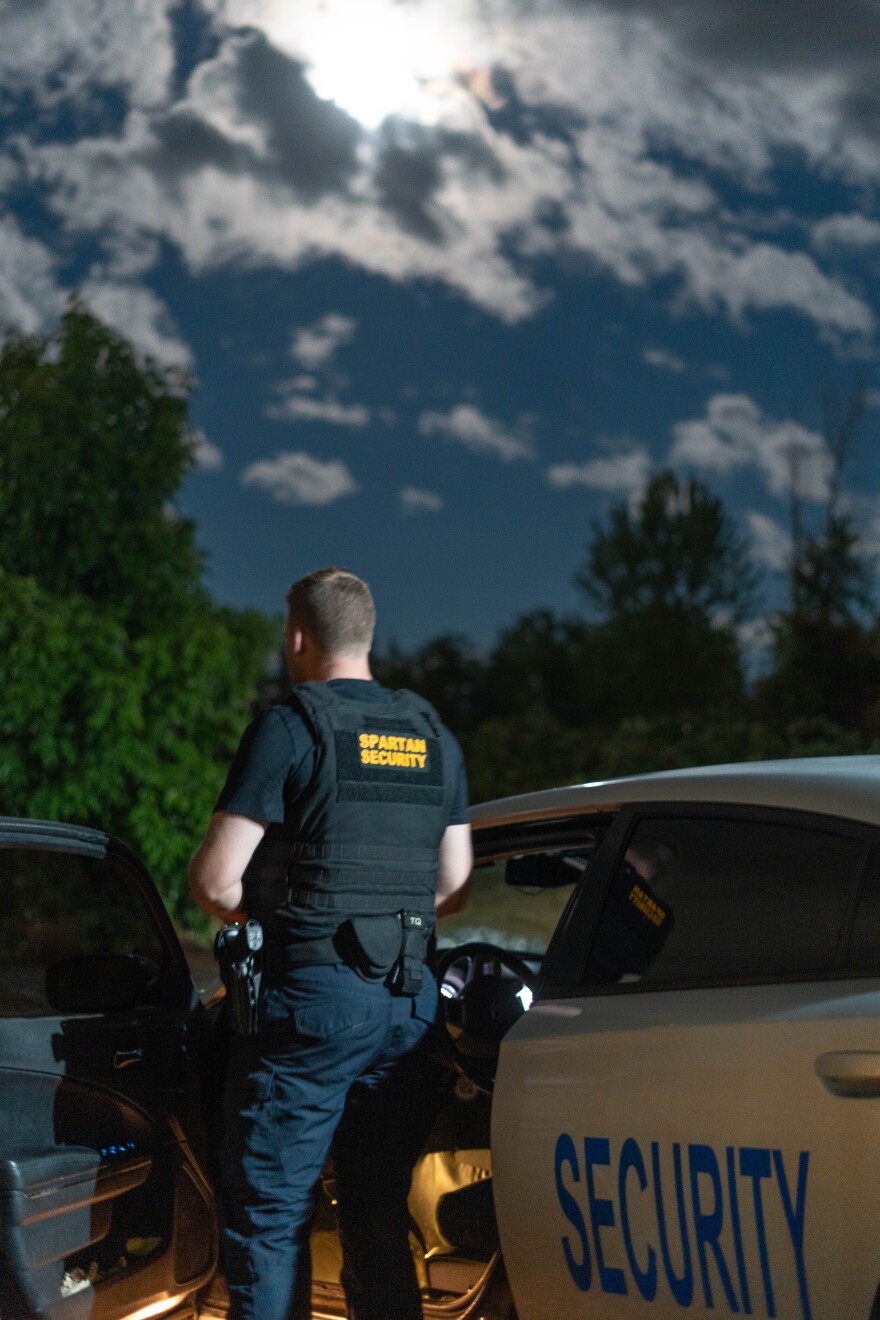Strange and sometimes worrying things appear after midnight to James Cobb as he patrols the streets of the Rogue Valley.
“All the fun comes out at night. So I call this the witching hours. It's mainly like 11 to 3 [a.m.]. Where anything goes,” says Cobb while driving during a night shift in August for the private security company Spartan Security Group.
He remembers one rainy and foggy night when he was parked to make a call.
“This person came across the rail in front of me, full-on beard. Couldn't even see his eyes… with a deer strapped to his back,” recalls Cobb. “Walks across the freeway, goes up into the woods. Complete, like, get-stuck-out-in-the-middle-of-nowhere movie vibes kind of thing.”
It’s not all spooky encounters for Cobb. Spartan employees work anything from concerts to clubs to government contracts. Recently, they’ve been patrolling more for private businesses.
Tonight, under a full moon, Cobb is visiting one Grants Pass property near a ravine that can be popular with homeless campers. The owners are concerned about trespassing.

He says he caught someone camping near the business the other night. Cobb told him he didn’t care where he went as long as it was on the other side of the ravine.
“He just went over and laid in the bush. So we won that battle and didn't have to do anything,” he says.
Cobb, dressed in all-black and wearing a tactical vest and sidearm, could be mistaken for a police officer at first glance. He says that can help with deterrence. Although as private security, he can’t actually arrest anyone. Sometimes people will give him trouble when they realize this fact.
But Cobb says the biggest challenges in this line of work aren’t dealing with trespassers or drunken bar patrons. It’s the company hiring enough employees to keep up with demand for their services.
That demand has been growing state-wide according to Sam Tenney with Oregon’s Department of Public Safety Standards and Training which regulates the industry. In the last year the number of unarmed security guards has increased by around 10% — reaching over 17,000. The number of armed guards has grown by a similar rate to over 2,300.
The vast majority of those working in private security are in the Portland area where police struggle to respond to high numbers of calls for theft and trespassing amid an opioid epidemic.
But the industry may be moving south.
“Anecdotally we know, and this is nationwide, that the private security industry has seen a surge in the last few years,” says Tenney.
He says part of the reason is that big public events are back on since the end of the pandemic. But another reason is that police departments around the state are struggling to hire enough officers.
In Southern Oregon, some department budgets never recovered after the timber industry declined along with its contribution to local government coffers. Even if a police department is fully staffed, it never has unlimited resources.
“In the patrol world, everything is triage based. It's what's important right now, what's happening right now,” says Sgt. Brent Mack with the Medford Police Department. “So a lot of times, unfortunately, if there's a minor trespass or theft — in the patrol world, that's at the bottom of the list for them to respond to.”
He says his department has created an efficient system for working with private security, who he says has a role as law enforcement’s “eyes and ears.”
“Honestly, I think we probably do this better than anybody in the state of Oregon. We have kind of a well oiled machine and a streamlined process,” says Mack.
Medford police have an online reporting system where private security can submit instances of minor crimes like theft they come across. Security workers can even submit photos of suspects which Mack says Medford police often follow up on.
Mack says he was recently contacted by a private security company that operates in northern Oregon that was thinking about expanding to the Rogue Valley. That company was impressed with the seamless communication between guards and police.
“They were kind of blown away, because they do not get that up in those urban areas like Portland,” says Mack.

Not everyone in Oregon has seen the increasing reliance on private security as a good thing. In 2021, Portland-based Echelon Protective Services was criticized for illegally removing homeless campers from public sidewalks, detailed in an investigation by Oregon Public Broadcasting. Due to questionable reports by that security company, the Multnomah County District Attorney’s office said they wouldn’t bring criminal charges against suspects that relied on testimony from those guards unless there was corroborating evidence.
Cobb, with Spartan Security Group, says his work is no substitute for police. Although the job requires some state training including skills in de-escalation. He says his company acts more as support for law enforcement.
Tonight he’s visiting a relatively new location for his company: Lava Lanes bowling alley in Medford. It’s cosmic bowling night and a calm has settled over the lanes before the blacklights are turned on and the party really starts.
“We've had numerous findings of firearms, things that aren't supposed to be in a bowling alley,” says Cobb. “And this… is why we run armed guards over here at this spot. It's been a request of ours.”
It’s been quiet tonight — no dramatic brawls or itinerant deer hunters. That’s alright for Cobb. As he says in the drive to the next location, it’s not just a job for him.
“We love the safety of others,” says Cobb. “We thrive on that. And that's why we're picking up so much work,” says Cobb.



